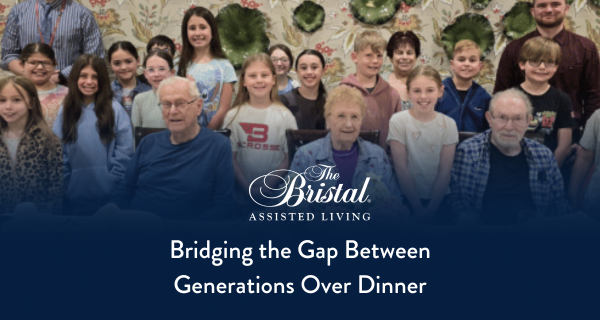At The Bristal Assisted Living, we know the importance of fostering community through connection -- and we're excited to announce our newest step in cultivating those relationships: a partnership with Generations Over Dinner, a nationwide initiative that brings together people of all ages for thoughtful, purpose-driven conversations around the dinner table.
What is Generations Over Dinner?
Launched by Modern Elder Academy (MEA) -- the world's first midlife wisdom school -- Generations Over Dinner is an inspiring nonprofit which invites people from different generations to sit down together and share perspectives on life's most personal and thought-provoking topics. In conjunction with AmeriCorps, MEA developed conversational prompts to provide opportunities for meaningful, multi-generational engagement. Whether it's love and relationships, purpose and meaning, or outlook and predictions for the future, the idea is simple: bring together as many generations as possible and discover what wisdom, humor, and connections emerge when we really listen to one another.
According to the co-founder and CEO of MEA, Chip Conley, "The power of cross-generational connection and collaboration could genuinely improve the world, and we're thrilled to help create a platform that encourages shared wisdom."
The Bristal Communities Take a Seat at the Table
At The Bristal communities, we've long understood the power of intergenerational connection. Now, through this partnership, we're strengthening our commitment-- one dinner at a time. We've already hosted a few Generations Over Dinner events in our communities, and each one has sparked thoughtful conversation, laughter, and surprising moments of connection among residents, family members, and guests from younger generations.
Many more dinners are planned throughout the year, and each one is an opportunity to deepen our culture of connection and inclusion.
Why It Matters: The Benefits of Intergenerational Connection
These gatherings aren't just heartwarming -- they're backed by scientific research. Intergenerational relationships can significantly improve well-being, mental health, and social connection for people of all ages.
A 2023 randomized controlled trial of the Big Brothers Big Sisters of America (BBBSA) mentoring program found that the youth who were matched with adult mentors experienced fewer depressive symptoms, improved academic performance, and experienced a reduction in behavioral issues.1
Older adults gain just as much from these interactions. In the AARP Foundation Experience Corps program -- where volunteers over 55 tutor students in public schools -- participants not only helped improve children's literacy but also reported better mental and physical health, increased self-esteem, and had more robust social networks. 2
The effects of these intergenerational relationships are long-term and deeply meaningful. In one of the longest, continuously running studies on aging, the Harvard Study of Adult Development also known as the Grant Study, which launched in 1938, researchers have repeatedly emphasized the impact that strong relationships -- especially those stretching across generations -- have on our health and well-being. 3
Dr. Robert Waldinger, director of the study, psychiatrist at Massachusetts General Hospital, and professor of psychiatry at Harvard Medical School said of the study, "The surprising finding is that our relationships and how happy we are in our relationships has a powerful influence on our health. Taking care of your body is important, but tending to your relationships is a form of self-care too."4
Regular intergenerational interaction can help improve cognitive function, relieve stress, lower depression risk, reduce inflammation, improve immune response, and even help delay the onset of Alzheimer's disease and related forms of dementia.
Read more about the benefits of intergenerational relationships.
Building Bridges, Breaking Bread
At The Bristal communities, we see these benefits daily. From youth performances to mentorship programs and community service projects, our residents are regularly engaged in activities that span generations. Now with Generations Over Dinner, we're adding a new -- and deeply meaningful -- dimension to that engagement.
Each dinner is themed around a larger topic. After brief introductions, questions are read aloud and used to prompt larger moments of storytelling, remembrance, and philosophy. Example question prompts might include:
-
- What is the best piece of advice one or both of your parents have given you?
- Do you think your idea of what love is and looks like changes as you age?
- Speak about a person who is no longer alive who had a powerful, positive impact on your life.
- Share a piece of wisdom you wish you could have told your younger self.
- What do you think is the greatest problem or crisis we face as humans? How does this problem make you feel?
- What do you want to be remembered for?
As Dr. Thomas Socha, who is leading a longitudinal study of the Generations Over Dinner initiative, said, "These conversations are not only fun -- they may be good for us." We couldn't agree more. When we create opportunities for different generations to listen to one another, we don't just build community -- we strengthen minds, bodies and spirits.
View photos from recent Generations Over Dinner events at The Bristal communities, and stay tuned for more stories, photos, and reflections from upcoming dinners.






1 Herrera, C., et al. (2023). “The Impact of Community-Based Mentoring for Youth: A Randomized Controlled Trial of Big Brothers Big Sisters.” Children and Youth Services Review. ScienceDirect.
2 Washington University Center for Social Development. (2023). “Studies Show That Students Aren’t the Only Ones Who Benefit from School-Based Tutoring.” CSD.
3 Waldinger, R., & Schulz, M. (2023). The Good Life: Lessons from the World's Longest Scientific Study of Happiness. Harvard Study of Adult Development.
4 Mineo, L. (2017, April 11). Over nearly 80 years, Harvard study has been showing how to live a healthy and happy life. Harvard Gazette.



